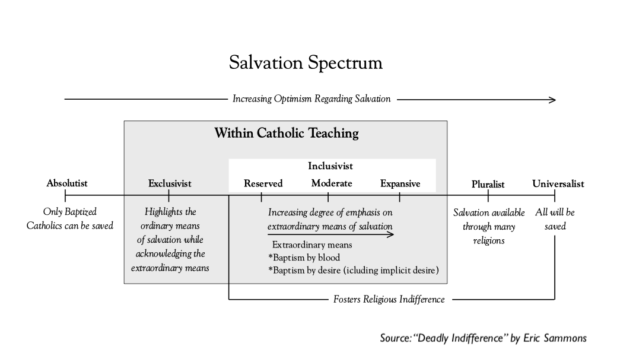Can non-Catholics be saved? If so, how?
These questions have been debated by Catholics since the time of the early Church. Back then, Catholics wondered about the Jews and Gentiles who lived before Christ, as well as believers who were martyred for the Catholic Faith but had not yet been baptized.
In later centuries, the debate surrounded the countless souls in the New World discovered by Columbus and all those in other lands who had never heard the Gospel preached. What would happen to them when they died? How can we reconcile these poor souls with the perennial Church teaching extra Ecclesiam nulla salus (“outside the Church there is no salvation”)?
Orthodox. Faithful. Free.
Sign up to get Crisis articles delivered to your inbox daily
Although the Church, particularly beginning in the 19th century, explicitly acknowledged certain “extraordinary means” of salvation, such as Baptism by Blood or Baptism of Desire, a Catholic before the 1960’s would likely sum up the Church’s teaching as: be baptized and live as a Catholic and you can go to Heaven; don’t be Catholic and likely go to Hell. Theologians might nitpick over the extraordinary means of salvation, but the pew-sitting Catholic assumed those extraordinary means were few and far between.
In the wake of Vatican II, however, all this changed. Catholic theologians and leaders began to grapple more deeply with the role of the Church in the process of salvation: the possibility of salvation for individual non-Catholics, as well as whether other religions can lead souls to salvation. An entire spectrum developed, from—on one extreme—those (very few) who still insisted that only (water-)baptized Catholics can be saved, to—on the other extreme—those who believed that everyone will one day be saved. I call this collection of shaded distinctions in belief the “Salvation Spectrum.”
The Salvation Spectrum can be confusing because it encompasses both theology and attitude. The nuances between the different schools are many, and even within one school there may be vast differences in attitude that lead to vigorous debate. Differences in theology—such as a disagreement on whether water Baptism is necessary for salvation—are easy to see and understand. What’s less clear but just as important are differences in attitude, such as how easy or difficult one believes it is for a non-Catholic to reach Heaven.
Generally speaking, one’s attitude toward mankind’s salvation can range from skeptical to hopeful. Do you believe salvation is something that is difficult to obtain, or is it something that most people, assuming they live a decent life, will eventually reach? Of course, your theology of God will shape your attitude. If you see God primarily as a judge, then you will likely see salvation as hard to reach. But if you see God primarily as an indulgent father, then salvation is rather easy to come by. And of course there is a whole range of attitudes between those extremes.
The reason it’s important to take into account attitude as part of the Salvation Spectrum is because attitude is one of the primary drivers of religious indifference. Too often the debate among Catholics today is limited to theology. And of course theology is essential. But it’s not the only driving force behind the practical beliefs of Catholics worldwide, whether lay or clerical. Attitude matters too.
The more liberal your attitude toward salvation, the more likely you are to be religiously indifferent—in practice at least, even if not in theology. If you believe, for example, that most non-Catholics will go to Heaven, then you will see little reason to try to convert them from their religions. If, on the other hand, you think salvation is only for a small subset of humanity, you are more likely to do all you can to convert your loved ones.
In order to make the Salvation Spectrum more understandable, I’ve created a chart to lay out the various views: 
Broadly speaking, we see five main theological schools in this debate: Absolutist, Exclusivist, Inclusivist, Pluralist, and Universalist.
The first school, the Absolutists, is insignificant in both number and influence today. It includes those who agree with Fr. Leonard Feeney that only Catholics who have been baptized by water can be saved. The Church formally condemned this view in 1949, and now very few hold to it.
The second school, the Exclusivists, is also small in number now, but it has grown in influence in recent years. Prior to the 1960s the vast majority of Catholics throughout history held this view. The Exclusivists believe that the Church is necessary for salvation and emphasize the ordinary means of salvation: water Baptism and visible membership in the Church. But Exclusivists, unlike the Absolutists, accept the possibility of extraordinary means of salvation such as Baptism by desire. However, they do not presume them nor do they highlight them. As shown in the Salvation Spectrum, the Exclusivist view is within Catholic teaching; it conforms to the magisterial teachings of the Church.
The third school, the Inclusivists, is the broadest, most diverse school. The distinctions within the Inclusivist school arise mostly from attitude and emphasis, not theology. Generally speaking, Inclusivists accept magisterial Church teaching that “outside the Church there is no salvation” yet they are salvation optimists. They highlight the extraordinary means of salvation and further emphasize what Catholics have in common with non-Catholics. In terms of influence and number, there is no question the Inclusivist school is the most predominant. This is the school of Popes John Paul II and Benedict XVI. Further, this camp encompasses Catholics across an otherwise diverse theological and ideological spectrum.
Pluralists comprise the fourth school. These are Catholics who have embraced the idea that not only can non-Catholics be saved, but that they can be saved through the practice of their non-Catholic religion. Whereas the end result—salvation optimism for non-Catholics—is similar to the Inclusivist school, the two views are theologically quite different. The Inclusivist insists that a non-Catholic who is saved is still saved through the Church in some mysterious way, but the Pluralist sees other religions as the means of a person’s salvation. This school, while it has become more prominent since the 1960s, is outside of magisterial Catholic teaching, although it has gained more acceptance in recent years from high-ranking members of the Catholic hierarchy.
The fifth and final school goes even further than the Pluralists. The Universalists believe that everyone will be saved; i.e., Hell (if it even exists) is empty. Within the ranks of Catholic theologians and Church leaders, there are few, if any, who openly advocate this position. Some have publicly said that they hope Hell is empty and declared that is a reasonable hope, but most of those who make these statements are members of the Inclusivist school theologically.
Again, much of the debate within Catholic circles since the 1960s has revolved around whether a certain theological view is orthodox or not. While debate like this is important, it fails to completely incorporate how Catholics come to their beliefs. Certain theological schools can remain technically orthodox but still lead Catholics to unorthodox conclusions.
For example, the real-world impact of growing salvation optimism among Catholics—whether that attitude is practiced by an Inclusivist or a Universalist—fosters religious indifference all the same. Even though the entire Inclusivist school attempts to maintain orthodox beliefs regarding “outside the Church there is no salvation,” the practical implication of highlighting the extraordinary means of salvation is that being Catholic isn’t all that important.
Perhaps the better question isn’t “Can non-Catholics be saved?”, but “How easy is it for non-Catholics to be saved?” Instead of presuming the salvation of non-Catholics, we should work for their conversion to Catholicism as if their souls depended on it. Because they very well may.
Adapted from Deadly Indifference: How the Church Lost Her Mission, and How We Can Reclaim It (Crisis Publications).
